| Rosa Rio, well-known theatre organist, the last of the Titans, passed away Thursday, May 13, 2010 in Florida. She was the last of the big-name theatre organists who could trace her career back to the 1920’s, playing organ intermissions in theatres and accompanying silent movies in the golden age of the theatre organ.
Rosa Rio began her musical instruction at the Eastman School of Music In Rochester, New York. Her teacher was theatre organ great, John Hammond, whom she eventually married. Upon
graduating from Eastman, she took theatre organist positions in Syracuse, Loew’s Burnside Theatre in New York and Loew’s Willard Theatre in Richmond Hill, Long Island.
|
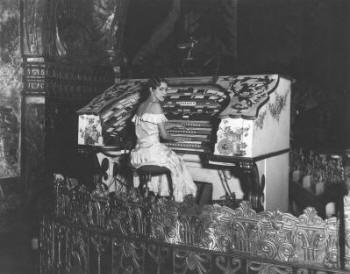 |
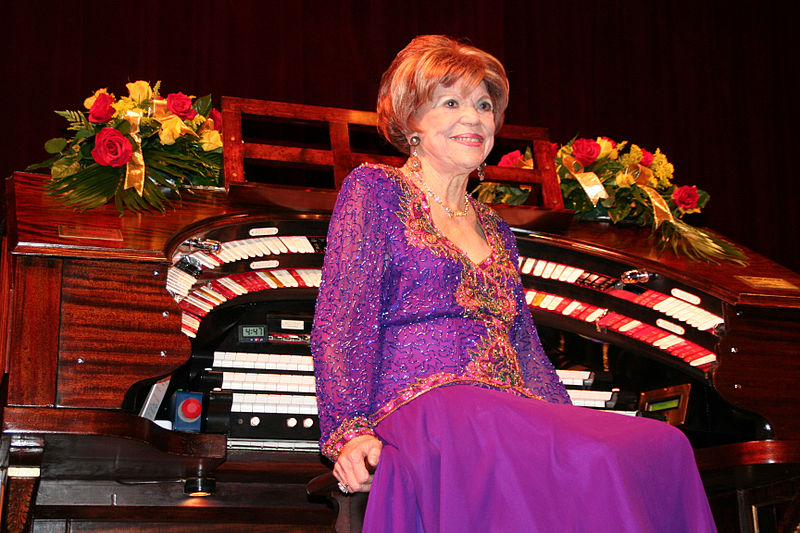 |
She did short stints at some at some of the other Loew’s houses in the New York City area before moving to New Orleans to the Saenger Theatre with its magnificent Robert Morton organ. Saenger Theatres comprised a chain of houses in the South and Rosa Rio toured most of them.
Eventually, as the Depression and sound films made theatre organists’ positions scarce, Rosa Rio traveled north to the Paramount Theatre in Scranton, Pennsylvania, and then in 1933 to the Brooklyn Fox. She was the last regular organist to play this organ and also the organs of the RKO Albee and the Brooklyn Paramount. Rosa also played at the RKO Patio Theatre in Brooklyn. Later she closed the Crown Theatre in New London, Connecticut.
|
| Since so many theatres were closing out the use of their pipe organs, Rosa Rio accepted a position as staff organist with the NBC Radio Network. It was by means of radio that she became best known. She played a great many soap operas and dramatic radio shows such as, “Cavalcade of America,” “Front Page Farrell,” “The Shadow,” Town Hall Tonight,” and “When A Girl Marries.” Her longest running radio show was, “My True Story.” She played as many as thirteen shows per week, five days per week. In addition to these shows Rosa had her own network broadcasts at various times, one of which was known as, “Rosa Rio Rhythms.” She is believed to be the first network organist to play the electronic organ and piano simultaneously. |
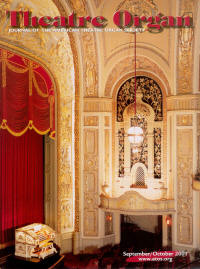
Read the complete story on Rosa Rio in the Sept./Oct 2001 issue
|
| |
|
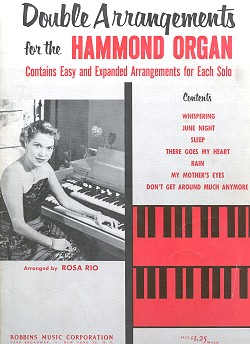 |
With the death of the “golden era” of radio came the development of television soap operas and dramas. Rosa played for a number of these shows in Shelton, Connecticut in 1960 where, as the wife of Bill Yeoman, professional radio announcer, she taught and did occasional radio and television work. In later years Rosa and Bill moved to Sun City Center, Florida (in the Tampa area) where Rosa continued to stay busy with concert appearances across the country and especially at the Tampa Theatre. It was my privilege to know Rosa Rio for approximately forty years. When I was writing my book on the life of Jesse Crawford and later on the history of the theatre pipe organ someone put me in touch with her. A friend of hers in Ohio, Stan Todd who owned the Stan Todd Steak House picked up the phone one day when I was interviewing him, and called her directly. |
| After a few words of introduction, he handed the phone to me and I had my first conversation with her. I felt rather timid in the face of such celebrity but she soon put me at ease. I began asking her questions---fact checking from my, as yet unpublished, manuscript on Jesse Crawford. I was immediately impressed with the clarity and detail of her memory. She remembered people and places and experiences from many decades before, as if it were yesterday. In succeeding years I continued to use her knowledge as an unimpeachable source of facts in writing articles or books which had to do with the theatre organ. |
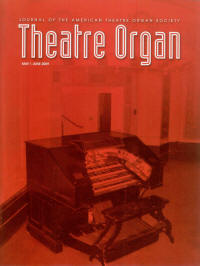
Read the recent update on Rosa Rio in the May/June 2009 issue
|
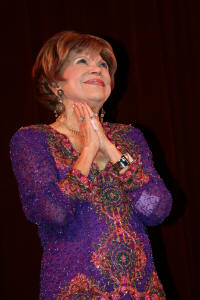 |
In 2003 I moved to the Tampa, Florida area and I was privileged to see Rosa and Bill Yeoman frequently. I was often in their home. I tried not to miss any of Rosa’s silent film presentations at the Tampa Theatre, which were usually very well attended with enthusiastic audiences. Rosa was in her element as she exposed younger generations to the art of silent film accompaniment. She always seemed tireless; a ball of energy and a person with a most positive attitude toward life. She had an endless fund of stories drawn from the “human comedy,” and I sometimes told her that, alas, I could not use some of the funniest of them as sermon illustrations.
Rosa had the privilege of working until close to the end of her life and that is exactly what she wanted. She was happiest when she had a project to undertake, but now the curtain has come down on a most remarkable life and with it, an era has come to a close forever.
May 15, 2010
Dr. John W. Landon |